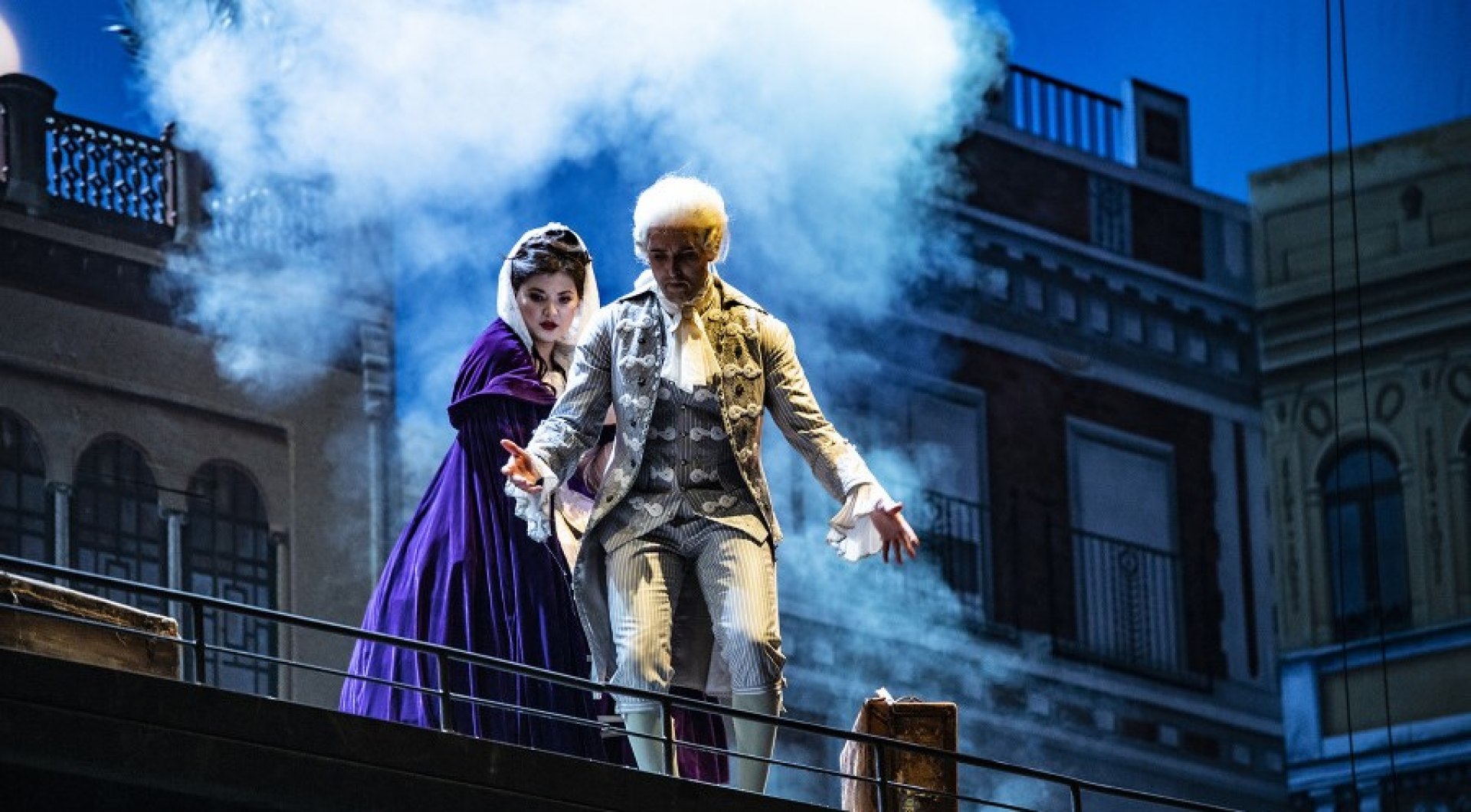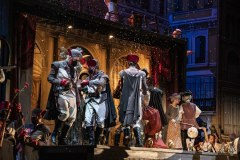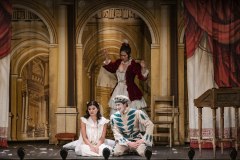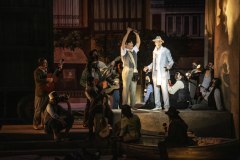The Barber of Seville
Mo | Tu | We | Th | Fr | Sa | Su |
The Barber of Seville - Gioacchino Rossini (1792 – 1868)
Melodramma buffo in two acts
Libretto by Cesare Sterbini, based on a drama by Pierre-Augustin Caron de Beaumarchais
First performed on 20. February, 1816 in Rome
Premiered at the Deutsche Oper Berlin on 29. November, 2009
Recommended for ages 12 and up
About the performance
About the work
It’s a rambunctious tale: an old curmudgeon is set on marrying his own ward of court with a view to snapping up her considerable inheritance. He leaves no stone unturned in his efforts to keep the fair Rosina cloistered from the outside world and thus from any potential young suitors. A pity, then, that Count Almaviva has fallen head over heels for her. Assisted by Figaro, an enterprising barber, he plans to outwit the old man, win over Rosina – and ensure that it’s love that attracts her to him rather than his rank and wealth. Not an easy job for Figaro, seeing as the opposite camp is scheming with equal tenacity … Love wins out in the end, and it turns out that all precautions were useless!
Pierre Augustin Caron de Beaumarchais [1732 –1799] dreamt up the character of the mischievous barber and wrote an entire comic trilogy about him, the first two instalments of which (LE BARBIER DE SÉVILLE OU LA PRÉCAUTION INUTILE [1775] and LA FOLLE JOURNÉE OU LE MARIAGE DE FIGARO [1778]) are world famous. Part 3, L’AUTRE TARTUFFE OU LA MÈRE COUPABLE [1792], was not such a hit, perhaps due to the upheavals of the Revolution. Although the revolutionary potential was especially palpable in the second part, with its brilliant soundtrack courtesy of Mozart [THE MARRIAGE OF FIGARO, 1786], the barber of the first part oozes disrespect, which inevitably makes him the central protagonist in this comic opera. Giovanni Paisiello had a runaway success with his musical version of BARBIERE in 1782, meaning that Rossini was up against a seemingly unassailable precursor when he resolved to compete directly with Paisiello in writing a comic opera based on the same material. And he pulled it off: 34 years after his rival’s own hit show he delivered arguably the wittiest and peppiest opera buffa in the history of the genre.
Synopsis
Place: Seville, Spain
Time: 17th century
Act 1
The square in front of Bartolo's house
In a public square outside Bartolo's house a band of musicians and a poor student named Lindoro are serenading, to no avail, the window of Rosina ("Ecco, ridente in cielo"; "There, laughing in the sky"). Lindoro, who is really the young Count Almaviva in disguise, hopes to make the beautiful Rosina love him for himself – not his money. Almaviva pays off the musicians who then depart, leaving him to brood alone. Rosina is the young ward of the grumpy, elderly Bartolo and she is allowed very little freedom because Bartolo plans to marry her once she is of age and thus appropriate her considerable dowry.
Figaro approaches singing (Aria: "Largo al factotum della città"; "Make way for the factotum of the city"). Since Figaro used to be a servant of the Count, the Count asks him for assistance in helping him meet Rosina, offering him money should he be successful in arranging this (duet: "All'idea di quel metallo"; "At the idea of that metal"). Figaro advises the Count to disguise himself as a drunken soldier, ordered to be billeted with Bartolo, so as to gain entrance to the house. For this suggestion, Figaro is richly rewarded.
A room in Bartolo's house with four doors
The scene begins with Rosina's cavatina, "Una voce poco fa" ("A voice a little while ago"). (This aria was originally written in the key of E major, but it is sometimes transposed a semitone up into F major for coloratura sopranos to perform, giving them the chance to sing extra, almost traditional, cadenzas, sometimes reaching high Ds or even Fs.)
Knowing the Count only as Lindoro, Rosina writes to him because she is interested in getting to know him better. As she is leaving the room, Bartolo enters with the music teacher Basilio. Bartolo is suspicious of the Count, and Basilio advises that he be put out of the way by creating false rumours about him (this aria, "La calunnia è un venticello" – "Calumny is a little breeze" – is almost always sung a tone lower than the original D major).
When the two have gone, Rosina and Figaro enter. Figaro asks Rosina to write a few encouraging words to Lindoro, which she has actually already written. (Duet: "Dunque io son...tu non m'inganni?"; "Then I'm the one...you're not fooling me?"). Although surprised by Bartolo, Rosina manages to fool him, but he remains suspicious. (Aria: "A un dottor della mia sorte"; "To a doctor of my class").
Count Almaviva, disguised as a soldier and pretending to be drunk, enters the house and demands to be quartered there. In fear of the drunken man, Berta the housekeeper rushes to Bartolo for protection. Bartolo tells the "soldier" that he (Bartolo) has an official exemption which excuses him from the requirement to quarter soldiers in his home. Almaviva pretends to be too drunk and belligerent to understand, and dares Bartolo to brawl. While Bartolo searches his cluttered desk for the official document which would prove his exemption, Almaviva whispers to Rosina that he is Lindoro in disguise, and passes a love-letter to her. Bartolo suspiciously demands to know what is in the piece of paper in Rosina's hands, but she fools him by handing over her laundry list. Bartolo and the Count argue loudly. Basilio enters; then Figaro, who warns that the noise of the argument is rousing the whole neighborhood. Finally, the noise attracts the attention of the Officer of the Watch and his troops, who crowd into the room. Bartolo demands that the Officer arrest the "drunken soldier". The Officer starts to do so, but Almaviva quietly reveals his true identity to the Officer, and he (the Officer) backs off. Bartolo and Basilio are astonished and mystified; Figaro laughs quietly at them. (Finale: "Fredda ed immobile, come una statua"; "Cold and still, just like a statue"). The confusion intensifies and causes everyone to suffer headaches and auditory hallucinations ("Mi par d'esser con la testa in un'orrida fucina; dell'incudini sonore l'importuno strepitar"; "My head seems to be in a fiery forge: the sound of the anvils deafens the ear").
Act 2
A room in Bartolo's house with a piano
Count Almaviva again appears at the doctor's house, this time disguised as Don Alonso, a priest and singing tutor who is substituting for the supposedly ailing Basilio. To gain Bartolo's trust, Don Alonso tells him he has intercepted a note from Lindoro to Rosina, and says that Lindoro is a servant of Count Almaviva who has dishonorable intentions towards Rosina. While Almaviva pretends to give Rosina her singing lesson ("Contro un cor"; "Against a heart"), Figaro arrives to shave Bartolo. Not wanting to leave Rosina alone with the singing teacher, Bartolo insists Figaro shave him right there in the music room. Basilio suddenly appears for his scheduled music lesson, but he is bribed by a full purse from Almaviva and persuaded to leave again, with much discussion of how ill he looks. (Quintet: "Don Basilio! – Cosa veggo!"; "Don Basilio! – What do I see?"). Bartolo overhears the lovers conspiring, and angrily drives everybody away. Berta vents about the crazy household ("Il vecchiotto cerca moglie").
A room in Bartolo's house with a grille looking out onto the square.
Bartolo orders Basilio to have the notary ready to marry him to Rosina that evening. Basilio leaves and Rosina arrives. Bartolo shows Rosina the letter she wrote to "Lindoro" and persuades her that this is proof that Lindoro is merely a flunky of Almaviva and is toying with her at Almaviva's behest. Rosina believes the story and agrees to marry Bartolo.
During an instrumental interlude, the music creates a thunder storm to indicate the passage of time. Almaviva and Figaro climb up a ladder to the balcony and enter Rosina's room through a window. Rosina accuses Almaviva, whom she believes to be Lindoro, of betraying her. Almaviva reveals his identity and the two reconcile. While Almaviva and Rosina are enraptured by one another, Figaro keeps urging them to leave. Two people are heard approaching the front door. They are Basilio and the notary. The Count, Rosina, and Figaro attempt to leave by way of the ladder, but discover it has been removed. Using bribes and threats, Almaviva coerces the notary into marrying him to Rosina, with Basilio and Figaro as the legally required witnesses. Bartolo barges in, accompanied by the Officer and the men of the watch, but too late; the marriage is already complete. The befuddled Bartolo is pacified by being allowed to retain Rosina's dowry. The opera concludes with an anthem to love ("Amor e fede eterna, si vegga in noi regnar!"; "May love and faith eternally be seen to reign in us").
Program and cast
Duration: 3 hrs / 1 interval
In Italian language with German and English surtitles
Pre-performance lecture (in German): 45 minutes prior to each performance
Cast
Conductor: Carlo Goldstein, Anna Handler (09.01.2026)
Director: Katharina Thalbach
Stage-design: Momme Röhrbein
Costume-design: Guido Maria Kretschmer
Chorus Director: Thomas Richter
Count Almaviva: Kieran Carrel, Kangyoon Shine Lee (25.12.2025 | 09.01.2026), N. N. (27.03.2026)
Bartolo: Misha Kiria, Simone del Savio (27.03.2026)
Rosina: Aleksandra Meteleva, Martina Baroni (09.01.2026 | 27.03.2026)
Figaro: Dean Murphy, Philipp Jekal (25.12.2025 | 09.01.2026)
Basilio: Patrick Guetti, Volodymyr Morozov (09.01.2026 | 27.03.2026)
Fiorillo: Navasard Hakobyan
Berta: Maria Vasilevskaya
An officer: Paul Minhyung Roh
A notary: Clara-Lisette Kesselmann
Chorus: Chor der Deutschen Oper Berlin
Orchestra: Orchester der Deutschen Oper Berlin
Deutsche Oper Berlin
The Deutsche Oper Berlin is an opera company located in the Charlottenburg district of Berlin, Germany. The resident building is the country's second largest opera house and also home to the Berlin State Ballet.
The company's history goes back to the Deutsches Opernhaus built by the then independent city of Charlottenburg—the "richest town of Prussia"—according to plans designed by Heinrich Seeling from 1911. It opened on November 7, 1912 with a performance of Beethoven's Fidelio, conducted by Ignatz Waghalter. After the incorporation of Charlottenburg by the 1920 Greater Berlin Act, the name of the resident building was changed to Städtische Oper (Municipal Opera) in 1925.
Deutsches Opernhaus, 1912
With the Nazi Machtergreifung in 1933, the opera was under control of the Reich Ministry of Public Enlightenment and Propaganda. Minister Joseph Goebbels had the name changed back to Deutsches Opernhaus, competing with the Berlin State Opera in Mitte controlled by his rival, the Prussian minister-president Hermann Göring. In 1935, the building was remodeled by Paul Baumgarten and the seating reduced from 2300 to 2098. Carl Ebert, the pre-World War II general manager, chose to emigrate from Germany rather than endorse the Nazi view of music, and went on to co-found the Glyndebourne opera festival in England. He was replaced by Max von Schillings, who acceded to enact works of "unalloyed German character". Several artists, like the conductor Fritz Stiedry or the singer Alexander Kipnis followed Ebert into emigration. The opera house was destroyed by a RAF air raid on 23 November 1943. Performances continued at the Admiralspalast in Mitte until 1945. Ebert returned as general manager after the war.
After the war, the company in what was now West Berlin used the nearby building of the Theater des Westens until the opera house was rebuilt. The sober design by Fritz Bornemann was completed on 24 September 1961. The opening production was Mozart's Don Giovanni. The new building opened with the current name.

 EN
EN DE
DE IT
IT FR
FR ES
ES RU
RU JP
JP RO
RO
 Seating plan
Seating plan 



